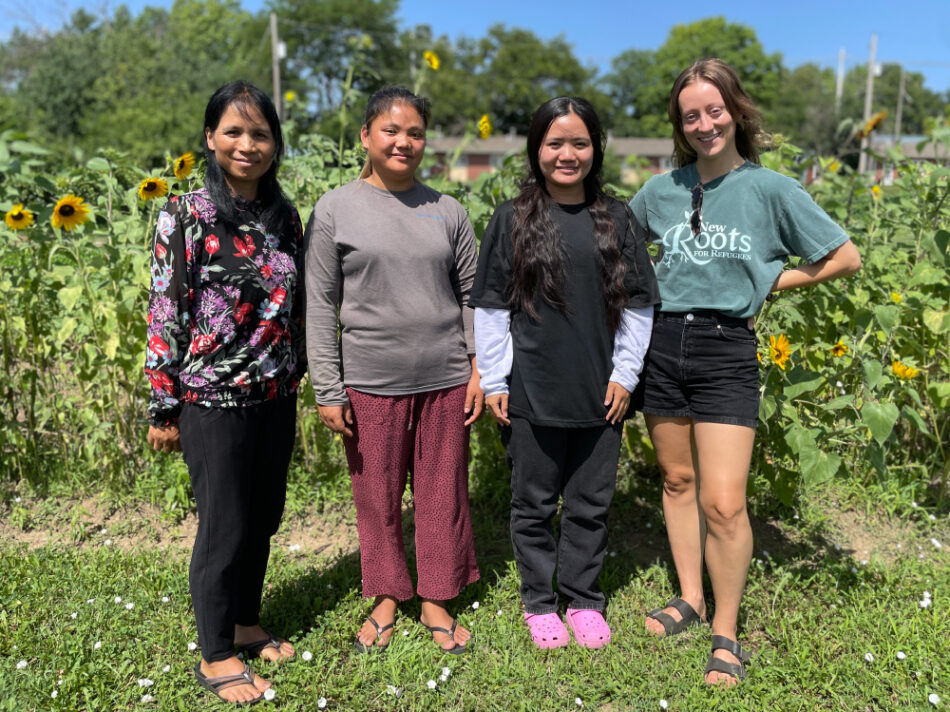
A bass line thrum of cicadas mingles with gusts of hot air as Aung Let Hung and Hlu Thang don wide-brimmed hats and head out to their garden plots at the Juniper Gardens Training Farm in Kansas City, Kan.
Both women are enrolled in New Roots, a four-year farmer training program established in 2005. Through mentoring and job training jointly run by Catholic Charities and Cultivate KC, farmers with language barriers and cultural differences learn how to market the items they grow.
New Roots supplies vegetables and herbs on a weekly basis to area 25 farmers markets and to farm-to-table restaurants, such as The Town Company, Corvino Supper Club & Tasting Room, Bluebird Bistro and Homesteader Café.
The program also operates a Community Supported Agriculture program or (CSA), a vegetable subscription program that distributes the harvest shares via four locations throughout the Kansas City metro area.
In 2023, the Kansas Local Food Purchase Assistance (LFPA) cooperative agreement program enabled Harvesters to purchase 1.6 million pounds of wholesale vegetables, fruits, dairy and protein from local farmers, including lettuce, potatoes, onions, zucchini and tomatoes, for distribution through its network of feeding programs. Funding for the program continues for the 2024 growing season.
“We had wholesale to farm-to-table restaurants but wanted to expand to schools and food pantries. Our wholesale sales have increased dramatically since last year, and the farmers are definitely really happy about that,” says Morgan Murphy, sales coordinator for New Roots.
“I think that wholesale is a really great outlet for them because of the language barrier. The farmer’s market is a lot of interaction, but if you have a wholesale customer it’s a bigger order and less communication. It’s getting them more familiar with that as a viable sales market.”
Both Hung and Thang are from Myanmar, formerly known as Burma. They fled government corruption and political suppression, a painful memory that causes Hung to tear up.
“Back in our country, we don’t have freedom and a good president. Things are not fair. They just think about the money. They don’t really care about people,” she says through an interpreter.
The four-year program provides a stair step to self-sufficiency, including agricultural classes covering soil management, irrigation, production planting and food safety, business markets, a tool library, volunteer mentors and English classes.
Each farmer tends a quarter-acre to a one-acre plot farming on 12.5 acres of land owned by the housing commission. A total of 45 farmers have graduated from the program.
Over the past decade, 70% of the farmers have come from southeast Asian countries and 30% have come from sub-Saharan Africa. In the future, the program will re-brand to offer wider access to all immigrants and English language learners.
The soil under Thang’s fingernails reveals her passion for growing plants. She tended a small garden at her home and was looking for a job when she learned about New Roots. Farming was not a stretch for her. “A lot of people from Myanmar know how to farm,” says the mother of four children ages 8, 6, 3 and 1.
The program has taught her about Midwestern vegetables and continues to get her out into the community by learning to sell at the local farmer’s market.
However, with so many graduates working at area farmers markets, Murphy says the program needed to find alternative markets.
Selling to Harvesters has provided a big boost, not only to the farmers, but also by helping to get more fresh food to neighbors in need.
“We are trying to expand and make our produce more accessible, and this is a huge way to do that, which is awesome,” she says.
Tang is reaping the rewards of the partnership, and she is grateful to Harvesters.
“Thank you so much for buying our veggies, we really appreciate it,” she says.
